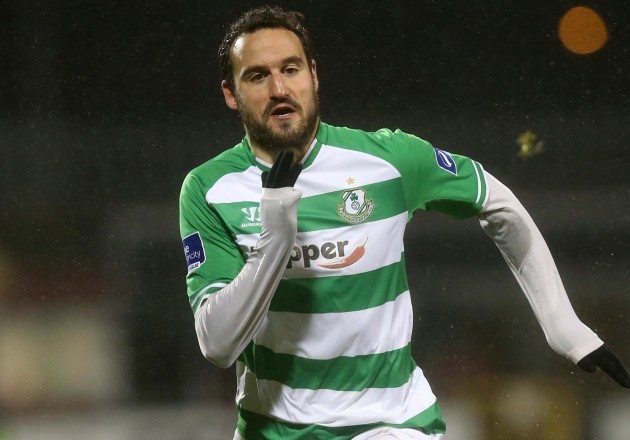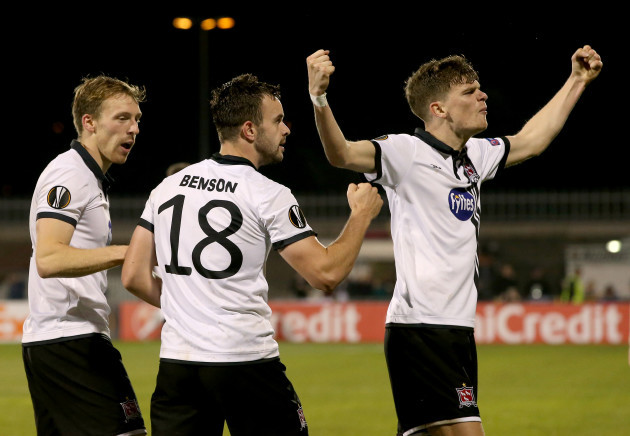THE LIFE OF a footballer is generally perceived as glamorous, yet for the vast majority in this profession, glory is in short supply.
Only the Irish Sea separates the Premier League and the League of Ireland geographically, but in most other respects, the two are worlds apart.
While an average Premier League player is a millionaire, the typical League of Ireland footballer is constantly fearing for his future, unsure where the next step may lie.
While Dundalk have managed to buck this depressing trend with their astonishing and highly lucrative (by Irish teams’ standards at least) European exploits, they are a welcome anomaly to the generally less encouraging developments of late.
In recent years, the league has unfortunately been dominated by bad news stories centred on clubs struggling to stay afloat and player wages stagnating at best.
And since Cork’s surprise FAI Cup final triumph, earlier this month, for everyone bar Stephen Kenny’s Europa League challengers, the off-season has well and truly set in.
It is a period that many players dread. The financial limitations of Irish clubs means most players are restricted to 44-week salaries and one-year contracts. Once the season ends, the uncertainty sets in. What is supposed to be a period of rest and relaxation is actually the most stressful part of the year for some. As The42‘s resident League of Ireland columnist John O’Sullivan once put it: “The off-season doesn’t exist, not for you. The only thing that turns off is income.”
Players contemplate the pros and cons of going on the dole versus getting a part-time job as they wait patiently for contract offers.
So the League of Ireland is a surreal environment in many ways. Players, if they impress on a consistent enough basis, can be called up to Ireland squads, and yet still play in front of half-empty stadiums more often than not.
It is a league whereby, virtually every young player — if they’re honest — hopes to escape and seal a move abroad to England or another far more exotic location.
And one individual who did manage seal a move abroad and earn a full-time contract was James Chambers. The Dubliner spent over a decade plying his trade in the League of Ireland with a number of clubs, including Shelbourne, Shamrock Rovers and St Patrick’s Athletic.
In his last year with Pat’s in 2015, Chambers claimed the club’s Player of the Season award and also made the PFAI Team of the Year. In January 2016, however, Bethlehem Steel — a Pennsylvania-based side in the United Soccer League, the third tier of the American Soccer Pyramid — came calling.
And while it has taken Chambers some time to grow accustomed to his new surroundings, he is enjoying life in the States so far. Moreover, the midfielder finished the US season particularly strongly, scoring some eye-catching goals in the process.
With the North American campaign having ended, Chambers has returned to his native Dublin and is already back in the gym with his personal trainer, as he prepares for next season, having taken just two weeks for “complete rest”.
“It went okay,” he tells The42, when asked about his debut season in the US. “I still think I’ve more to offer. I’m getting used to the style of the game and stuff like that.
“With the couple of goals towards the end of the season, people started to take a bit more notice (of me).
In the US, it’s different, people are more concerned with your stats, with your assists and with your goals than they are maybe with your performance. So, as a player, you’ve got to be tuned into that side of things as well — that’s what they like over there.”
Although he is happy with life at present, at 29, Chambers is already contemplating career options after football. Coaching and media work are two potential paths, and he is about to start his youth cert, while the ex-Hamilton Academical player has already acquired plenty of experience coaching various age groups for Malahide and his local team, Baldoyle.
I don’t think everybody who plays the game can be a coach,” he says. “I might fall into the bracket that I know a certain amount, but after that, my mind might go blank and I might not really take to it that much. It’s definitely something that I want to dip my toe into and figure out for myself.
“It’s different when you help with the younger age groups, you get more satisfaction out of it because you see a bit more of them taking on board what you’re saying as opposed to the senior players.
You’re just there to facilitate the senior players really. You may give them some ideas, but as regards them getting much better under your tutelage, (the chances are) very slim, especially at the amateur level, because the guys are just doing it for fun. It’s a couple of days a week to stay active, and there’s a fun element.
“It’s different with the kids, they want to get better. Obviously, it’s fun too, but they’re looking to progress and they’re only young kids, so they all want to be professional footballers.”
Furthermore, as someone who spent several years playing in the League of Ireland, Chambers is more than a little familiar with the difficulties of keeping busy during the off-season.
Some footballers would put money aside to sign on for welfare and live off their savings,” he explains. “Others would do the same, but work. Some guys would probably do neither and just live off the welfare essentially.
“That’s the world we live in and for players coming into the league or being in the league, you know what it’s all about. You have no choice but to deal with it. It’s not ideal and it’s not right — if you’re trying to run a professional league, there needs to be a professional environment.
For me, the last three or four years on the trot, I’ve worked in Brown Thomas. Last year, I worked in a company out in Park West. I knew a person out there.
“Basically, I’ve worked during the off-season, because it’s not ideal sitting around the house. You miss the game, but you don’t want to be sitting around, moping, either.
As much as football is your main source of income, you need to stay busy, otherwise you’d go crazy.”
https://vine.co/v/5nqFeOvqxv6
The issue of footballers needing to be deeply committed to their primary profession for the other nine months of the year complicates the matter further. Not too many companies are willing to take on staff for just three months each year.
Of course, that’s the difficulty,” Chambers says. “The only thing I found was helpful to me in retail, the company were only looking for someone for the Christmas period. It suited me down to the ground. That’s why I continued to go back because we both had an understanding that it was going to suit us both.
“(Finding that job) was pot luck, to be honest. Then last year, the company I was with knew that I was going to be going off to America, so they were completely fine with it.”
One of the benefits of playing in the US is that Chambers now gets the rare luxury of a 52-week salary, although it wasn’t a “major factor” in his decision to move abroad.
It was something that interested me to go and to try America. When the opportunity arose, I was going to take it anyway. But the fact that the contracts are actual contracts, that was another bonus. It wasn’t anything major, but it was a small factor, it was nice.
“My sole focus is getting fit and being ready to go for pre-season in January, as opposed to thinking: ‘Where are my next few pounds going to come from? Where is my next move from here?’”
And while player salaries and uncertain futures are among the most serious issues in football currently, perhaps unsurprisingly, Chambers says these topics are seldom discussed in the ultra-macho environment of the dressing room.
“It wouldn’t be a major part (of discussion) because players live in the now and the present. It’s a cliché, but really, all they care about is the upcoming game and training and enjoying yourself. That’s what it’s about.
Nobody’s going to start talking about the future, because truthfully, it scares a lot of footballers. And there’s a male bravado environment in the dressing room, so nobody wants to be the one that seems like they’re the weak link and like they’re a little bit petrified of what’s around the corner.”
Such uncertainty and doubt is not healthy for players in the long term and often seemingly leads to worrying consequences. In 2014, a study conducted by the players’ international union, Fifpro, assessing six leagues including the League of Ireland, found that 26% of current players suffered from depression or anxiety, while this number rose to 39% among retired players.
Chambers, who has spoken openly about his problems with depression in the past, feels too many players are ill prepared for life outside of football.
I’m of the older generation,” he says. “All we did was play football, there was no thought of what we were going to do after football. Whereas now, it’s becoming a younger man’s league, especially the League of Ireland — that’s my opinion from the outside.
“Players now need to start thinking about (the future) early doors. ‘I need to go to college, to get an education and you can still play part-time on the side. But when I have that piece of paper in my pocket, then I can start to pursue a full-time career. If it doesn’t work out, I can always fall back on it.’
Some players think: ‘I’m going to be a professional earning 200 or 300 a week,’ when they’re 18 or 19. But unless you’re one of the few that continues to go up the ladder, the likes of (Dundalk star) Daryl Horgan and people like that, you’ll need to look at life outside of football, and that comes a lot quicker than is (often) anticipated by the player himself.”
Chambers will return for another season in America shortly and one person who would ideally like to follow suit is Ryan Coulter.
Coulter, whose father Phil is the indeed the famous Irish musician, spent the end of last season with Longford Town, having left a financially stricken Athlone side earlier in the campaign.
In 2009, he was part of Dundalk’s A side and was their second-choice first-team goalkeeper for a brief period.
However, Coulter left the Lilywhites for the University of San Diego, gaining a degree in communications and marketing in the process, while playing football on the side in America.
After completing his degree, Coulter returned to Ireland and had a stint at Sligo Rovers in 2014. He had hoped to return to the US prior to the start of last season, but had to undergo an operation to get a lump removed from his back. By the time he recovered, the slots for international players joining American sides had “dried up,” so he opted for another season in the domestic league.
I came back and signed with Athlone with Alan Matthews and played five games there and then there was a mass exodus out of Athlone. Fortunately enough, I had a number of calls from different managers around the Premier Division. I took Longford up as the option. There were other options, but to me, it seemed like a good move and I knew I’d be busy if I got into the team — although there were no guarantees.
“Fortunately, I got straight into the team and went on to play half the season. I know the team got relegated, but from a personal standpoint, to get in and play 15 games or whatever it was, I was happy from that point of view.”
Following Longford’s relegation, Coulter became one of the many out-of-contract League of Ireland players looking for a new club.
While he has received no “concrete” offers yet, a return to the US is the 27-year-old’s preferred destination.
I’ve been in university over there for five years. I did very well while I was over there. I have an American girlfriend. And with the toing and froing and the lack of stability in the league here, it makes it quite difficult to settle down (in Ireland).
“My head would almost be set on trying to get away to America. I’d be open to a couple of different options here, but first and foremost, I’d be looking to America to get settled.”
Irish and British players are often criticised for their ostensible reluctance to play football in countries further afield. However, there are signs that the situation is changing of late. Robbie Keane, Kevin Doyle and Sean St Ledger may be the most high-profile examples, both some notable ex-League of Ireland players including Eamon Zayed, Colin Falvey and Richie Ryan have also enjoyed encouraging spells Stateside in recent times.
Nevertheless, Coulter still feels not nearly enough Irish footballers are aware of the benefits of playing abroad in places other than England.
Unfortunately, so many people in this country have the blinkers on and they don’t really see the bigger picture,” he says. “It’s England or it’s back to the League of Ireland, where it’s ‘oh, I’ve failed and I’ll just have to play in the League of Ireland,’ which isn’t the case.
“You’d look at kids here, and I’d have been the same at youth level, you’re thinking: ‘I’ve got to get over to England.’
There’s more to football than just England. People think ‘I’ll go over and sign for a Championship team and be on several grand a week, happy days, I’ll be living the high life. But a lot of these kids go over and it doesn’t happen for them.
“Even the fallout with a lot of Irish kids, they don’t even come back to play in the League of Ireland, they fall completely out of the game. I’d be urging players to stay here to get a bit of experience and maturity before they go away to see what professional football is all about, because it is tough and it is ruthless.”
Moreover, the uncertainty and the unsatisfactory wages are big reasons why Coulter would prefer a move abroad rather than another campaign in the League of Ireland.
How someone can be considered a full-time pro on a 44-week contract is beyond me,” he says. “It’s a shame because there are a lot of great pros in the league and to subject them to 44-week contracts is embarrassing really.
“The players put so much work in and to have it ‘rewarded’ with these short-term contracts is just not right.”
Like Chambers, Coulter, who is also preparing for his youth coaching cert as well as undertaking an online personal trainer course, emphasises the importance of staying occupied during the dreaded off-season.
“Once the season finishes, it really does dry up and you find that you’ve so much free time on your hands,” he says.
On a Tuesday night if you’ve got training, you’re thinking about training all day. You’re leaving the house at four o’clock to get there for half five or six to get through the traffic. An hour-and-a-half training session still takes about four hours out of your day depending on how far away you live from training.
“But once it all finishes, you have got a lot of time on your hands. I even found the same being full-time in Sligo. If you don’t stimulate your mind, you can just waste your day doing nothing.
You have to work (in the off-season) as well. I know a lot of lads that would have kids and wives and whatever else. A lot of them sign on (to the dole) because it just guarantees that they’re able to put a roof over their heads. With the 44-week contracts, sometimes, the players are left with no alternatives.
“Once the season finishes, if they’re going around trying to hand out CVs for jobs, that might take two-to-four weeks to get done. Then you’re looking at only getting work for only two-and-a-half months anyway. So if people know that you’re a footballer, they’re not going to want to employ you in a job you’re going to want to stay in.
You might get temporary work in a sports shop. But if you want to get work for experience after football, it’s going to be extremely different. If you’re an architect or an engineer or any business and you’re looking to get a bit of experience, businesses are going to be reluctant to take you in, because they know you’ll just be walking out the door in two months.”
Coulter is at his most passionate when the aforementioned 2014 study is mentioned. He says he is not surprised by the 26% figure in relation to footballers’ problems with depression.
When you look at the league historically, or even this past season, you have teams struggling to pay wages. You have teams talking about pay cuts and possibly going under. From having been in that situation, where the team is talking about pay cuts and saying ‘you have to take a deduction,’ we might have to let players go or we might have to do this.
“When you sign a contract with a club, you’re signing, you’ve agreed on the money. We’re not talking about 10 grand a week where you think ‘look, I’m going to be grand, I don’t have to worry about my money situation’. The League of Ireland is set up in a way where you really have to go in and fight for every euro that you’re going to get, because teams are trying to pinch it as much as they can.
When you allocate what you’re earning from the club into paying your electricity, your gas and everything else, and to be able to put money aside when the season finishes, now all of a sudden when you have people talking about pay cuts and everything else, you’re thinking ‘where’s this money going to come from for all this?’ Be it putting a child through school, buying school uniforms, putting dinner on the table, paying bills, phone bills, car insurance, whatever it’s going to be, absolutely that’s going to stress you out.
“I don’t have any kids, but I’ve a girlfriend and even for me, it’s stressful when they start talking about these things. Luckily enough, the PFAI are there as well and are able to back you up when these things come around.
It may affect your performance, but first and foremost, mentally you’re going to struggle, because you’re going to be worried about everything else apart from your football.”
While reiterating the importance of the work done by the PFAI in raising awareness about the potential pitfalls that players can succumb to, Coulter is still alarmed by the number of footballers he encounters with no obvious future ambitions.
“From playing with younger lads, it is remarkable the amount of them that don’t really have a plan set up for when football finishes and they’re living for the here and now.
What happens if I don’t get a club or what happens if I get injured? Any of the negatives I don’t think they’re looking at. They’re thinking: ‘If I have another good season here, maybe I’ll get away to England.’ I’ll do this or I’ll do that. You’ve got to have a fallback plan. Fundamentally, that was why I ended up in America.
“I was with Dundalk’s A team at the time and I was second choice up there and I said to the manager: ‘Look, I’ve got a few offers to take scholarships in America and I’m going to go.’
Why did I do that? Because fast forward four years later, I come back and I’m playing in the league, but the difference is, I’m playing in the league now with a degree behind me and some kind of security, whereas had I just stayed, yeah I’d have played a lot more games in the league and people would know more about me, but what happens then when I retire? It’s Ryan Coulter with four more years in the league, but Ryan Coulter without a degree. Who would I prefer to be? The Ryan Coulter I am now.
“You look at the fallback plan for most of the players in the league and they probably haven’t got it. The PFAI mentioned a statistic about a staggering amount of people (in the league) that don’t even have a Junior Cert. That’s worrying stuff.
There are lads that are working full time and playing part time on the side and they’re in good jobs with good options to be able to progress in companies. I know we’ve a few lads in the team working in banks and various other places. They’re good steady career jobs. Even when you retired from football, you’d stay in them.
“But it is worrying when you look across the leagues, especially with the lack of stability in them, the fact that it’s a one-year rolling contract, so many of these players could easily fall out of the league. What do they do then?”
The42 is on Snapchat! Tap the button below on your phone to add!





